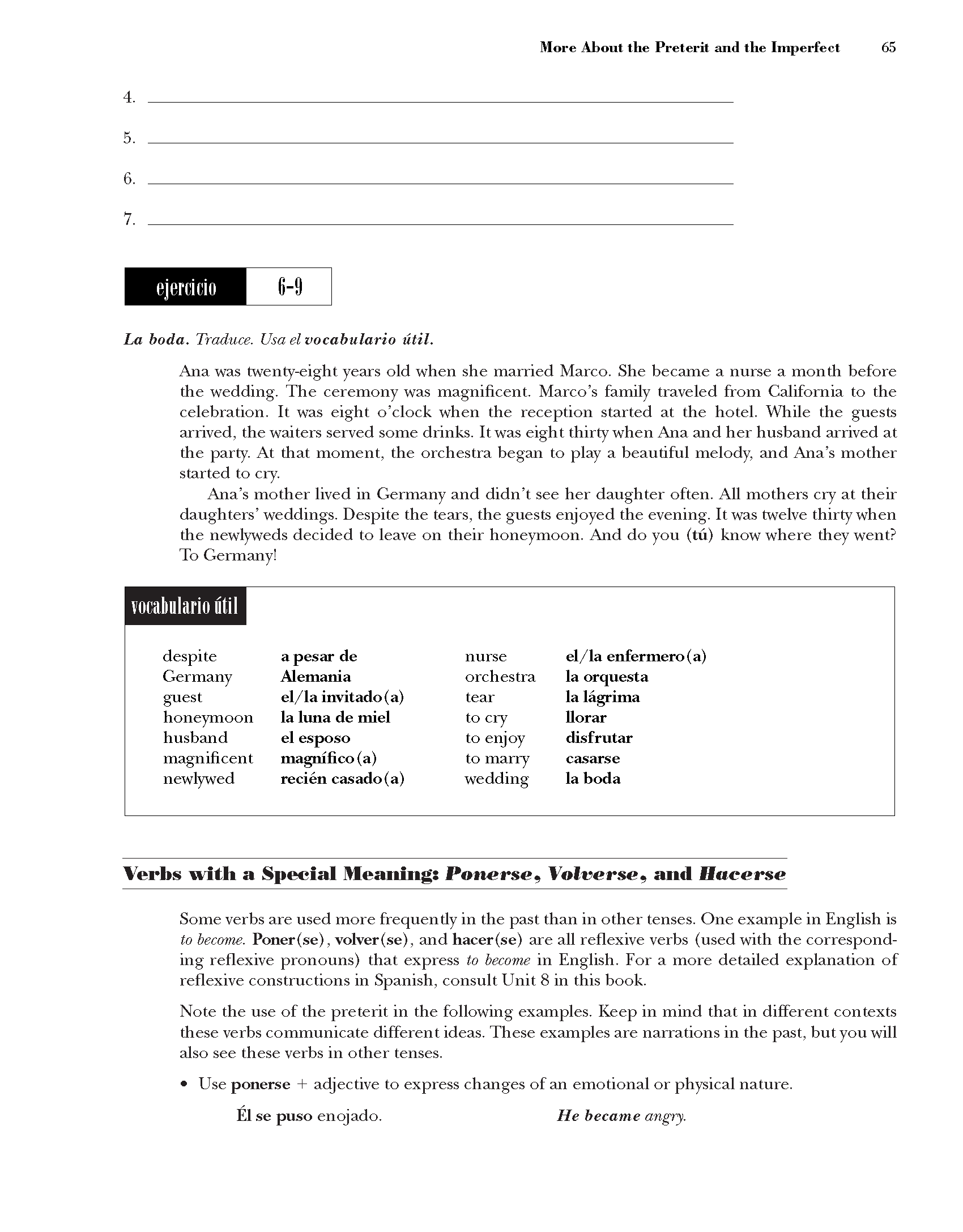CSG076

Morę Ab out the Preterit and the Imperfect
65
4.
5.
6. 1.
6-9
ejercicio
La boda. Traduce. Usa el vocabulario util.
Ana was twenty-eight years old when she married Marco. She became a nurse a month before the wedding. The ceremony was magnificent. Marco’s family traveled from California to the celebration. It was eight o’clock when the reception started at the hotel. While the guests arrived, the waiters served some drinks. Itwas eight thirty when Ana and her husband arrived at the party. At that moment, the orchestra began to play a beautiful melody, and Ana’s mother started to ery.
Ana’s mother lived in Germany and didn’t see her daughter often. Ali mothers ery at their daughters’ weddings. Despite the tears, the guests enjoyed the evening. Itwas twelve thirty when the newlyweds decided to leave on their honeymoon. And do you (tu) know where they went? To Germany!
|
despite |
a pesar de |
nurse |
el/la enfermero(a) |
|
Germany |
Alemania |
orchestra |
la orquesta |
|
guest |
el/la invitado(a) |
tear |
la lagrima |
|
honeymoon |
la luna de iniel |
to ery |
llorar |
|
husband |
el esposo |
to enjoy |
disfrutar |
|
magnificent |
magmfico (a) |
to marry |
casarse |
|
newlywed |
recien casado(a) |
wedding |
la boda |
Yerbs w ilii a Special Meaning: Ponerse9 V©Iverse9 and flacerse
Some verbs are used morę frequently in the past than in other tenses. One example in English is to become. Poner(se), volver(se), and hacer(se) are all reflexive verbs (used with the correspond-ing reflexive pronouns) that express to become in English. For a morę detailed explanation of reflexive constructions in Spanish, consult Unit 8 in this book.
Notę the use of the preterit in the following examples. Keep in mind that in different contexts these verbs communicate different ideas. These examples are narrations in the past, but you will also see these verbs in other tenses.
• Use ponerse + adjective to express changes of an emotional or physical naturę.
El se puso enojado. He became angry.
Wyszukiwarka
Podobne podstrony:
CSG076 Morę Ab out the Preterit and the Imperfect 65 4. 5. 6. 1. 6-9ejercicio La boda. Traduce. Usa
CSG076 Morę Ab out the Preterit and the Imperfect 65 4. 5. 6. 1. 6-9ejercicio La boda. Traduce. Usa
CSG074 63 Morę Ab out the Preterit and the Imperfect To ask a question using this construction, use
CSG072 61 Morę Ab out the Preterit and the Imperfect Here are some expressions associated with the u
CSG074 63 Morę Ab out the Preterit and the Imperfect To ask a question using this construction, use
CSG074 63 Morę Ab out the Preterit and the Imperfect To ask a question using this construction, use
CSG102 Reflexive Verbs and Reflexive Constructions 91 8-11ejercicio En la tienda. Traduce. Usa el vo
fig5 w e ais o offer seminars that last sk hours, where we talk ab out the benefits of style sheets,
3 AN UNPUBLISHED DOCUMENT AB OUT THE GREEK REYOLUTTON 723 Another important element for the ide
5 AN UNPUBLISHED DOCUMENT AB OUT THE GREEK RE V OLUTTON 725 taking important decisions (as the
więcej podobnych podstron